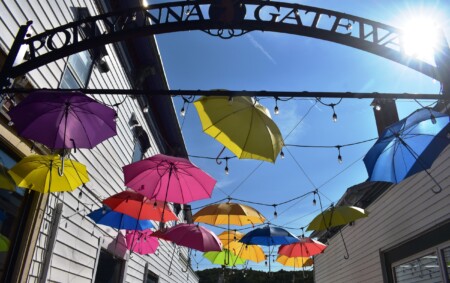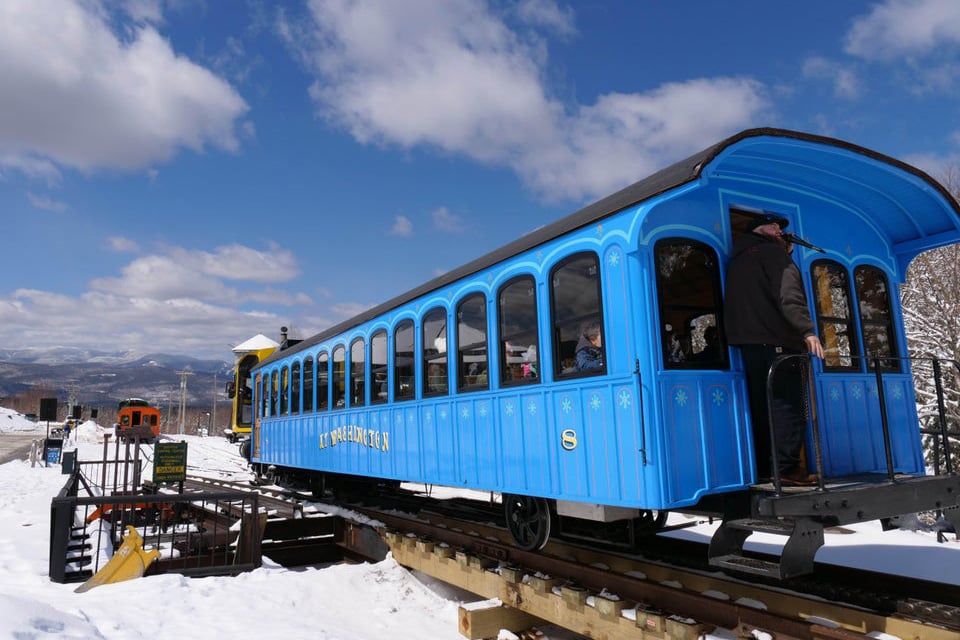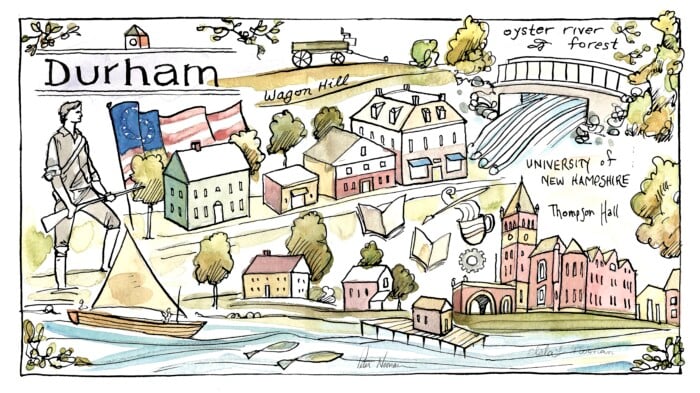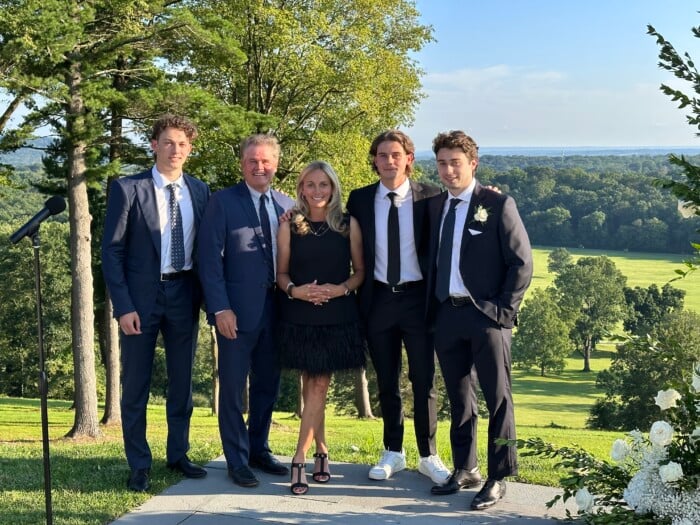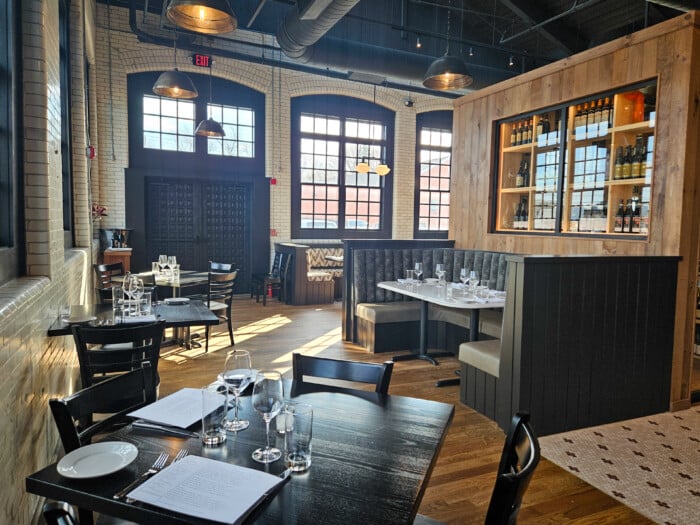Visiting Littleton, the Thriving College Town (Without the College)
Littleton’s funky vibe keeps it forever young
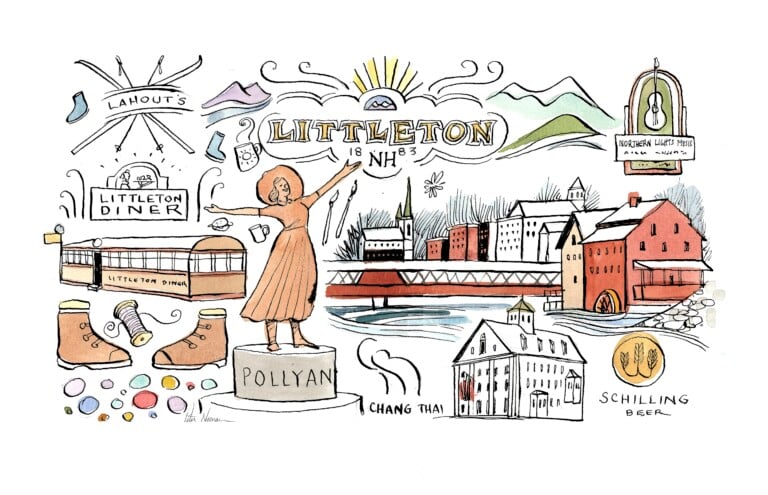
Frank Sinatra never made it to Littleton as far as we know. Had Ol’ Blue Eyes visited this Grafton County community, it would have been his kind of town, perhaps second only to Chicago.
Located on the banks of the Ammonoosuc River, on the northern edge of the White Mountains, Littleton has an eclectic funkiness that combines the arts with the outdoors, a sprinkling of high-tech manufacturing and allure of craft beer.
Although not a college town, Littleton feels like one because of its next-door neighbor, Franconia, which for a brief stretch from 1963-1978 was home to Franconia College.
When the liberal arts college was open, many of its staff and some of its students lived in Littleton. After the small school closed, some of both groups stayed to work or start businesses there.
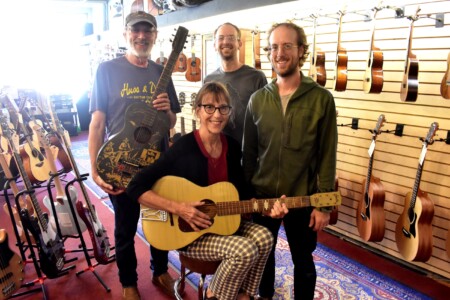
The Salomon family poses for a photo at Northern Lights Music, their 46-year-old business in downtown Littleton. In front is Moocho (aka Marjorie), while in the back are husband Dan and the couple’s sons, Asher and Ben.
Franconia College alumni Dan Salomon and his wife, Moocho, have owned and operated Northern Lights Music since 1978.
Dan studied bass and fingerstyle-blues guitar at Franconia College, while Moocho — a variation of “Marjorie” — studied weaving and art but now plays ragtime guitar, ukulele, piano, flute and bass.
The couple, who are originally from Worcester, Mass., and Orchard Park, New York, respectively, are residents of neighboring Bethlehem, although they consider Littleton their true home.
Both Dan and Moocho have led and played in several bands, with Moocho most recently playing bass for the punk-tinged Not Your Mother.
Northern Lights specializes in guitars and is believed to be the northernmost business of its kind in New Hampshire. In addition to selling guitars, the Salomons also repair them, assisted by sons Ben and Asher.
The couple, on occasion, also provide information to fans of the late GG Allin, a punk rock musician who was born in nearby Lancaster. Dan at one time recorded with Allin, who died in 1993.
Today, Littleton’s music scene is slightly tamer but still vibrant, boasting The Loading Dock, a nonprofit venue “dedicated to presenting original art from emerging and established artists,” and North Country Community Radio, which broadcasts at 99.9 FM.
Back in the mid-1970s, Littleton, although technically a town, “was the big city to go shopping,” Moocho recalls.
“The paper mill was still running then,” says Moocho, as was the Saranac glove factory. After those businesses ceased operations for the day, Moocho remembers seeing their uniform-clad employees walking past Northern Lights, which has been located at several addresses downtown, before settling into its current location on Main Street in 1982.
She believes some of those people looking into Northern Lights then “didn’t know what to make of the hippies when they came to town.”
Despite its success, which includes international customers, Moocho doubts that Northern Lights would have done as well in a larger community.
“This is a small, family-run business,” she says, and Littleton is the ideal place for it.
Littleton is centrally located, she said, and easy to get to via Interstate 93, which itself is not that far from I-91, and Vermont and Canada.
Dave Harkless, who is a longtime Littleton resident, and the owner of Littleton Bike & Fitness, took a different route to get to Littleton than the Salomons.
“I’m a Johnnie Whaler,” says Harkless, who earned a culinary degree from Johnson & Wales University.
He worked at restaurants on the seacoast of Maine where “we were slamming the lobster” before coming west and cooking in Lincoln and also in Waterford, Vt.
One summer, while looking for a part-time job, he met the then-owner of what is now Littleton Bike & Fitness, and found his true calling.
“I was a rough mechanic,” he says, but quickly learned the trade and to embrace his new hometown.
Harkless has served as an officer with the Littleton Area Chamber of Commerce and the Mount Eustis Ski Hill as well as PRKR MTN, a 25-mile network of mountain bike, hiking, skiing and running trails founded by Littleton native Taylor Caswell, commissioner of the state Department of Business and Economic Affairs.
Protecting Main Street
Harkless credits the Littleton Industrial Development Corp. for bringing new businesses to town, and town leaders for protecting small businesses on Main Street by directing “big box” retailers to set up on Meadow Street, several miles away.
Littleton was a town built on sewing shoes, said Greg Eastman, a Littleton native. The owner of the Hunkins & Eaton Insurance Agency, Eastman said Littleton is growing all over, including in the Apthorp section, which includes Lahout’s Country Clothing, Ski & Snowboard Shop and the expanded Littleton campus of White Mountain Community College.
“Growing up, I thought this (Littleton) was a wonderful place, and it still is,” Eastman says.
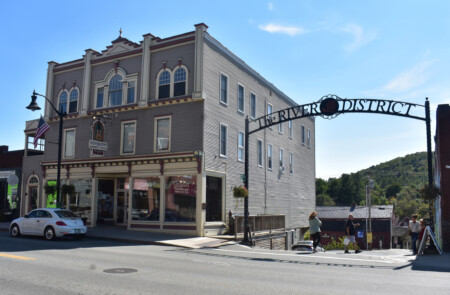
The entrance to Littleton’s River District from Main Street, with Northern Lights Music on the
corner and the Schilling Beer Store and Tasting Room in the background.
The industrial park has grown, he said, and its tenants include two-Canada-based companies. Rotobec is a heavy-equipment attachment manufacturer while Genfoot America makes Kamik Outdoor Footwear and specializes in injection molding and sewing assembly.
Thanks to the town’s economic vitality, Littleton Regional Healthcare has expanded, Eastman said, adding that, “for a town of 6,000, it’s quite a facility. Our population is 6,000, but it can run up to 15,000 to 20,000 people a day” between workers and visitors.
Eastman attributes the rise of Littleton’s economy to skilled, local labor, of which there is a still a shortage, he said, but also to the fact that the town has its own water and power department whose rates are well
below neighboring communities.
Littleton has a dynamic theater scene, he said, and is home to several breweries, foremost among them Schilling Beer, which was founded by four men from Traverse City, Mich. The quartet, after some extensive market research, concluded that the northern bank of the Ammonoosuc was an ideal place to set up shop because of its proximity to four population centers: Boston, Burlington, Portland and Montreal.
Littleton’s secret sauce, however, is its volunteers, among them the late Dave Ernsberger, says Eastman.
A former IBM executive who came to Littleton to be closer to his family, Ernsberger opened a gift store on Main Street and was a force behind linking Main Street to what is now the River District.
Ernsberger, who died July 2, and his wife, Nancy, who predeceased him by two months, were world travelers who brought home much of the best they saw to Littleton, including pianos that are rolled out, weather permitting, onto Main Street for anyone to play.
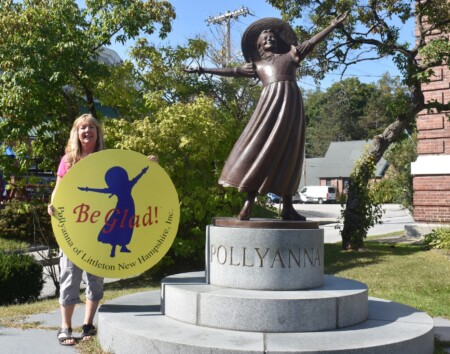
Standing next to a statute of the Pollyanna character, created by local author Eleanor Hodgman Porter, Veronica Francis holds a sign that promotes the theme of gladness that Pollyanna exemplified.
Ernsberger was also the inspiration for Harmony Park, which, according to the town’s website, is an all-weather instrument park that allows “individuals of all ages, skills and abilities the chance to make sounds, tones and songs at five different musical stations embedded in the ground.”
John Hennessey, a Littleton native and a 1994 graduate of Littleton High School, is the president and CEO of the Littleton Coin Co.
The town has always had a “culture of volunteerism,” says Hennessey, past president of the Littleton River District Redevelopment Commission.
That group was followed by the creationof the River District Redevelopment Commission.
“I remember Main Street’s less-successful days,” Hennessey says, but gradually “there were a lot of people to do heavy lifting,” among them the town’s elected leaders.
Veronica Francis, who has promoted Littleton via GoLittleton.com for more than 20 years and runs the GoLittleton Glad Shop on Main Street, says Littleton is a “walkable community” that offers many amenities in a small area.
Littleton’s Main Street, she wrote in an email, “has won a Great American Main Street Award, been named one of the top 10 Main Streets in America and is a favorite spot to stroll. In the last few years, Main Street storefronts are full to capacity with unique shops, restaurants and a new old-fashioned ice cream shop — The Sweet Shop.”
Main Street is already home to Chang Thai Café, whose chef and owner, Emshika Alberini, recently opened a seafood-themed restaurant, The Catch, about a mile south.
Francis said three other restaurants are slated to open this fall, among them, one that serves Indian cuisine. Two others specialize in cocktails and tapas.
A “can do” town, Littleton is also New Hampshire’s “Be Glad” Town, in an homage to hometown author Eleanor H. Porter (1868-1920), who in 1913 created the character of Pollyanna. Francis calls Pollyanna “the world’s most optimistic character.”
A bronze statue of Pollyanna is on the lawn of the Littleton Public Library. On the second Saturday of every June, the town, and all of New Hampshire, celebrates Pollyanna Glad Day.
The Pollyanna book is “required reading” in Brazil, Turkey and Australia, says Francis, who downplayed criticism of people for being “too pollyannish.”
Anyone so labeled, she said, can get a special sticker at the GoLittleton Glad Shop that says, “‘Proud to be a Pollyanna,’ and we encourage them to cherish their optimistic outlook.”
“The Pollyanna spirit isn’t for everyone, and some still sneer at the idea of ‘being glad,’” Francis sums up, “but the amount of visitors coming to Littleton to just connect with the Pollyanna story is proof that the hundred-year-old story is still a powerful message.”
Championing the Arts in Littleton
Littleton made national news in 2023 when the board of selectmen entertained, but never
formally acted on, an ordinance that would have regulated art in municipally owned places.
The community responded.
Duane Coute, general manager of Littleton Chevrolet, helped draft a letter that was signed
by more than 1,000 people — including several other prominent North Country businesses —
that criticized the board’s handling of discussions about public art by and about LGBTQ+ people.
The New Hampshire Business Committee for the Arts recognized Coute in May with its
Changemaker Business Leader award.
Coute says credit for the award should be shared with the town.
“This is not for me. This is a group of people, concerned citizens and the community, getting
together that helped to change the narrative,” Coute told NH Business Review in May on the “Down to Business” podcast.
— Mike Cote

